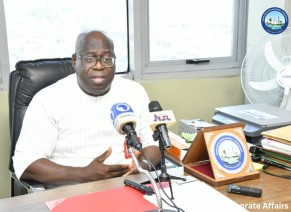Admin I Monday, 01, 2024
NDDC’s Foreign Scholarships, Strategic Intervention – Education Director

PORT HARCOURT, Nigeria – The Foreign Post-Graduate Scholarship Programme of the Niger Delta Development Commission, NDDC, has been described as a strategic intervention for the training of quality manpower to ensure the sustainable development of the Niger Delta region.
The NDDC Director, Education, Health and Social Services, Dr George Uzonwanne, who said this in an interview at the Commission’s headquarters in Port Harcourt, noted that the scholarship scheme was aimed at preparing a new set of scientists from Niger Delta region, especially with the inclusion of Artificial Intelligence as one of the areas of study.
Uzonwanne dispelled fears that some of the foreign scholarship beneficiaries may use the programme as a spring board to emigrate, rather than return after their studies to apply their knowledge to the service of the country.
He said: “Our scholarship award letter has a clause that says you are expected to return to Nigeria on completion of your studies. Bear in mind that this programme is not just about sending people overseas. We are sending out people who are willing to come back to develop the Niger Delta and that is one of the things we have done over the past 12 years.”
Uzonwanne stressed that the Foreign Post-Graduate Scholarship Scheme, which was started in 2010, was meant to equip Niger Delta youths with relevant training and skills.
According to him, there was need to position young graduates from the region to compete globally in various professional fields, noting that before now, the oil and gas industry had discriminated against the fresh graduates from the region, whom they dismissed as not possessing requisite qualifications.
He stressed that the foreign scholarship scheme was designed to expose the graduates to other developed environments outside the country. “It is our belief that the skills they acquire will add value to the development in the Niger Delta. So far, we have been proved right as those that benefited from the programme in the previous years have justified the need for the advanced training programme,” he said.
He acknowledged the outstanding performances of some of the beneficiaries who studied in the United Kingdom, noting that one of the brilliant scholars, Dr. Mustapha Abdullahi, was recently appointed as the Director General of the Energy Commission of Nigeria.
He remarked: “It may interest you to know that one of our scholars was recently appointed by the President Bola Ahmed Tinubu as the Director General of the Energy Commission. He just came back a few years ago. To be the DG of the Energy Commission is not a small feat. You must be experienced and you must be available in the country. We have similar success stories around.”
The Director expressed optimism that the programme would continue to produce outstanding scholars given the transparent process adopted in selecting them, noting: “The competition for the scholarship programme was intense, as the Commission had to select from over 25,000 online applicants. Out of this number, 5,000 wrote the Computer Based Test at the Rivers State University.
“As you finish writing the test, at the click of a button, you get your score. So, there is no question of they changed my scores, or I passed and they failed me.”
According to Uzonwanne, about 1,987 were invited for the oral interview, where a panel of examiners, made up of lecturers and professors from different universities across the country, recommended the 189 candidates that got the 2023/2024 post-graduate scholarship.
He added: “We had a panel of five judges in the fields of Engineering, Medicine, Management, Geology and IT. The number of candidates interviewed varied from state to state. For instance, states like Akwa Ibom, Rivers, Delta and Bayelsa had more slots on account of their high volume of oil production, while states like Cross River, Abia, Imo and Edo, had less.”
“In states like Imo and Abia, we had double cut off points to ensure that the oil producing communities were fairly represented because the mandate of the NDDC places emphasis on addressing the challenges of those communities.”

